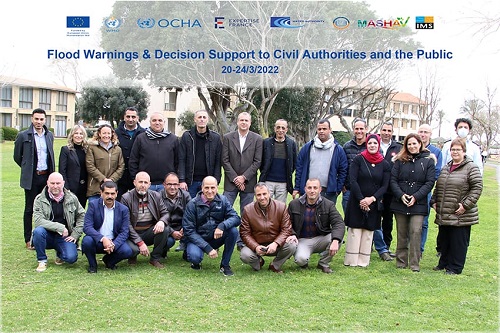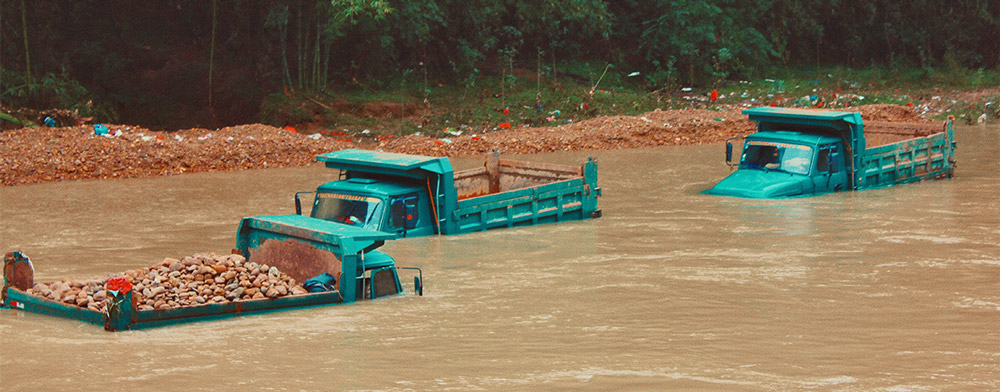Flood prevention in Jordan, Israel and Palestine: progress through technical cooperation
In the event of a natural disaster, human security mainly depends on the responsiveness of the first responders and the effectiveness of their action. Expertise France develops a cross-cutting and sustainable intervention strategy to meet the international cooperation objectives for crisis prevention and management.
The HIP FEWS project implemented by Expertise France aims to strengthen the regional flood early warning system in Jordan, Israel and Palestine in order to improve disaster risk management. It is part of the dialogue between Jordan, Israel and Palestine (JIP dialogue) initiated by the United Nations Office for Coordination of Humanitarian Affairs (OCHA), which aims to build capacities and cooperation on the preparation and response to emergencies.
Helping build the expertise of hydro-meteorological services to reduce disasters
The Sendai Framework for Disaster Risk Reduction strengthens the move from an approach based on disaster response to disaster reduction. It provides a global action framework, which Expertise France follows, to encourage countries to engage in responsible disaster risk management.
The HIP FEWS project specifically aims to provide Jordan and Palestine with equipment to measure, forecast and alert against flash floods, which pose a high risk in the Jordan, Israel, Palestine area. Building the expertise of the hydro-meteorological services and strengthening data exchanges between the three countries are both central to this pilot project.
In December 2021 in Larnaca (Cyprus), Expertise France gathered the meteorological and hydrological services of the three countries to work on formalising a resolution on sharing meteorological and hydrological data at regional level. It is expected to be signed in the coming months.
At the same time, other more operational mechanisms have been established, such as the creation of a WhatsApp group between the meteorological services of the three countries. This constitutes a real step forward in the dialogue between institutions and experts at regional level.
Israel, Palestine, Jordan: the importance of regional meteorological cooperation
The importance of institutional and operational cooperation can be seen in transboundary contexts and basins. Some countries in the region have better meteorological and hydrological measurement and forecasting tools than others. Regional cooperation between the agencies of the three countries helps disseminate data, reports and alerts among all the stakeholders in real time, in the short or medium term, and therefore drastically reduces risks of loss of life and potential damage.
This regional cooperation between the meteorological and hydrological services has made real progress since the start of the HIP FEWS project, and has been formalised through the resolution on data sharing mentioned above.
Training on alerts in March 2022 has strengthened this cooperation by:
• Increasing mutual knowledge of how the services of the three countries operate at the national and regional levels;
• Discussing potential follow-up for the project, for which phase 1 should reach completion at the end of May 2022. The countries have been able to express their needs for a phase 2, in terms of measurement equipment, priority risk areas, the additional training required, and the continuation of efforts on data sharing;
• Providing the meteorological and hydrological services and services responsible for disaster management in Jordan and Palestine with the expertise required to implement alerts and decision-making tools, in order to prevent and respond effectively to flood risks.
Examples of British, Irish and Italian alert mechanisms were presented. Other experts shared their expertise and recommendations, including the Israel Meteorological Service (IMS) and Word Meteorological Organization (WMO). Finally, several case studies and lessons learned in European and US contexts were presented to illustrate the exchanges.
More specifically, the partners were given guidelines on how to establish alert thresholds and the type of data to use (field sensors, satellite imagery, radars, etc.), the modelling tools available for weather forecasting, and how weather services can send standardised alert messages (CAP Common Alerting Protocol) to optimise their comprehension and the organisation of the emergency response by the competent authorities.

To find out more, read HIP FEWS project sheet


